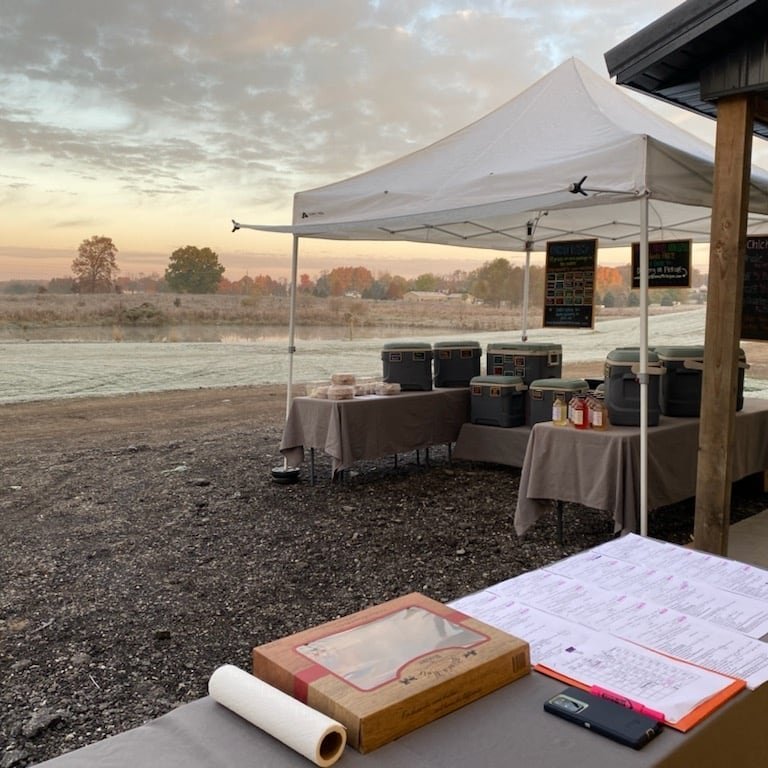Tips to go From Hobby to Full-time Farmer
Prior to becoming a successful Full-time Farmer, Tom Bennett of Bennett Farms started small as a Hobby Farmer. Over several years, he has built up his Farm business in Michigan to support his family of six. Now, Bennett Farms serves hundreds of Buyers, offering clean, sustainable pasture-raised meats.
In a recent podcast, Tom shared some simple tips and tactics that helped propel his Farm success today:
Tip #1: Don’t Get Discouraged
When you begin Full-time Farming, you cannot expect to grow a huge business overnight. Grow your products, build a customer base, and learn how to market and attract potential Buyers. The only way to build your revenue as a Farmer is to have Buyer orders to fulfill.
“If you think you're just gonna open up a delivery area, and overnight you're just gonna have a flood of orders, you're going to be disappointed, because it takes time to build up that customer base.”
It is important to get the word out at local markets. Educate attendees on your Products, practices, and story to build a relationship with potential Buyers. Offering fulfillment options and communicating outside of the market will help improve convenience and grow your customer base. You cannot always depend on consistent foot-traffic or weather at markets.
After you acquire a number of customer emails (through online or in-person marketing efforts), then begin offering deliveries and pick-ups. Deliveries and pick-ups make it easy and convenient for your Buyers, but they also put you in front of more potential customers.
When dropping off an order in a given neighborhood, other locals may see the signage on your truck or van, or ask neighboring Buyers how they can purchase your Farm-fresh food. If you have a pick-up location at a local school, whoever is on campus will also be exposed to your Farm Brand.
Orders may be slow in the beginning, however you cannot give up after a few weeks. Growing a large base of Buyers will help you turn a profit. Start small before your business booms; it will not happen overnight.
Tip #2: Be Personable
Being personable as the face of your Farm is important. If you’re at a local market, Buyers must decide between two or more Farms when considering a purchase — your attitude may be the deciding factor.
Providing high-quality products is table stakes, but a good experience and warm personality will attract customers and build loyalty. Showing Buyers that you care about them personally can also win over indecisive purchasers. Asking about their kids, their work, their general health, and other personal details can make Buyers feel cared for and build trust.
Authenticity opens the door to strong relationships with your Buyers. Building trust will bring customers back to your store time and time again. Once you build loyalty, it’s important to encourage ongoing purchases. Markets are a great place to advertise your online store, especially with flyers or a QR code, leading them to your website.
Physical marketing assets will stick with your Buyers, since they can take them home. Including your Farm Logo and other Brand assets (e.g. business cards, stickers, magnets) will keep your business top-of-mind. Tom Bennett creates Buyer loyalty by offering 50 cent credits to customers who return his egg cartons at local markets. With a strong Farm Brand and quality products, your base of Buyers will grow, and so will your sales.
Tip #3: Market Regularly to your Buyers
After you secure an initial base of buyers, keep them informed of when, where and what Products are available for purchase. Marketing to your Buyers regularly will keep your Farm top-of-mind. QR codes leading to your Farm store or to an email sign-up list will help you capture new Buyers.
Collecting emails at markets can help you secure thousands of dollars in additional Sales. Tom has an employee that collects hundreds of emails at markets, giving the Farm a direct avenue for ongoing communication that can encourage further purchases. Offering promotional coupons, such as $5 off a purchase (by signing-up for his email list), gives Tom the opportunity share send updates about Farm happenings, products, and opportunities at any time.
Once you attract new Buyers, you must convince them to continue purchasing on an ongoing basis (e.g. Subscription). In addition to quality products, well-branded Farm packaging can help instill trust and loyalty to your Farm. Tom recommends investing in high-quality, custom-branded Farm labels for your Products. When Buyers have your products in hand, you want them to remember your Farm Brand.

Every package of meat that you sell is an advertisement for your business. If you're still using your butcher's label that says ‘Joe's Butcher Shop, processed for Bennett Farms,’ you're just advertising for your butcher shop on every package.
- Farmer Tom
Get the word out about your Farm in your local community. Sharing your Farm practices in interviews and at events can attract new Buyers, who are interested to learn more. You may also invite members of your community to visit your Farm.
Holiday events, field trips, and Farm dinners can attract new and old customers, and help further strengthen your relationship with local community members. These avenues of marketing will go far, as customers share these experiences with others in your community (through social media or verbally), which helps attract more Buyers.
Tip #4: Know you Can’t Please Everyone
In any business, you want to make sure your customers are happy, because they fuel your Farm income. This can be even more important as a Farmer, since you may have a personal relationship with your Buyers, who may live closeby.
Nevertheless, stay true to your principles surrounding Farm Sales. Stand firm in your Farm product pricing and selection. If you are working to please every customer at the expense of your business, you may need to reevaluate your practices. While you want to make Buyers happy, don’t be afraid to lose some finicky customers who are difficult to please. If something is going to increase costs for your Farm operations, then let the customer find another Farmer.
For every Buyer you lose, know that you can gain another customer that respects your policies and will be easier to please. Try not to make exceptions for individuals, or bend over backwards for customers who don’t respect your business. Maintain firm and consistent policies to grow your business and contain your costs, so that your Farm can increase its profit margins.
Tip #5: Avoid Trendy Products
It is easy to get caught up in trendy products that may attract a high price point. However, niche products that sound exciting should not necessarily be the starting point for your Farm business. In livestock, focus on 2-3 primary species that have steady demand and focus on getting those products right (and profitable), before branching out into trendy products or varieties.
Listen: A Profitable Farm Business is a Sustainable Farm Business - Part 1
Listen: A Profitable Farm Business is a Sustainable Farm Business - Part 2
While others in your area may offer niche products (e.g. bison), you must first get your Farm operations in order before narrowing your market opportunity. Tom tells Farmers to remember that you are running a Farm, not a petting zoo. Niche products may be exciting, but the majority of the market is not eating bison everyday. However, most Americans are eating beef, pork, poultry or eggs consistently. Keep it simple, and don’t get caught up in the hype.
Tip #6: Making the Jump to a Full-time Farmer
Before you quit your day job, be certain that the revenue and profit margins from your Products can sustain you as a full-time Farmer. There is no question that the transition will be hard, especially the first year after growing beyond a Hobby Farm business. However, supporting your family is the top priority, so focus your efforts on products and activities that will help you secure a stable income.
It will be scary when you first quit your regular job. Consider all the avenues that will contribute to your Farm growth and long-term success (online store, email marketing), before making the leap. Identify the best opportunities to meet and attract Buyers - it is key to building your business.
Tom Bennett started as a Hobby Farmer and grew into a successful 7-figure Full-time Farm business. Learning from Tom (and other Farmers like him), can help your Farm navigate the transition from a Hobby to a Full-time Farmer. And, don’t be afraid to ask for help from other Farmers - they can offer wisdom, resources and experience that can help your Farm succeed.
Conclusion
The move from Hobby to Full-time Farm can be daunting, but it is possible with careful planning, a good strategy and a clear avenue to a strong, local customer base. Many Farmers, like Tom Bennett, have made the jump and seen the benefits, leveraging Barn2Door to grow and manage their business.
If you’re looking to make the transition to a Full-time Farmer, Barn2Door offers an all-in-one solution to help Farmers manage direct sales - online and in-person.
As a Barn2Door customer, your Farm can speak with Tom (and other successful Farmers like him), to help you navigate the transition and build a thriving Farm business. To learn more, watch this 5-min video.
To hear Tom speak more on the transition from Hobby to Full-time Farming, listen to his podcast episode here:



